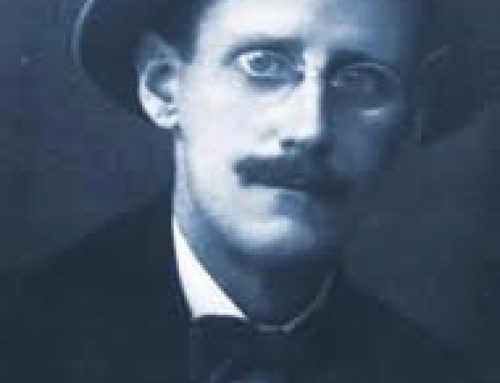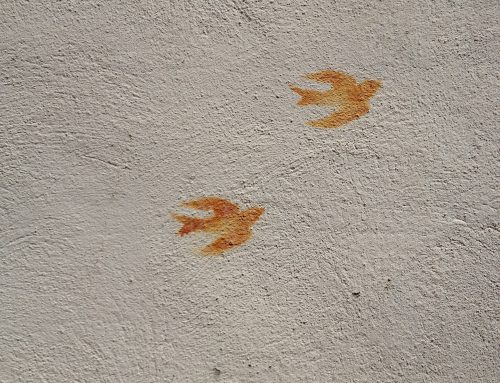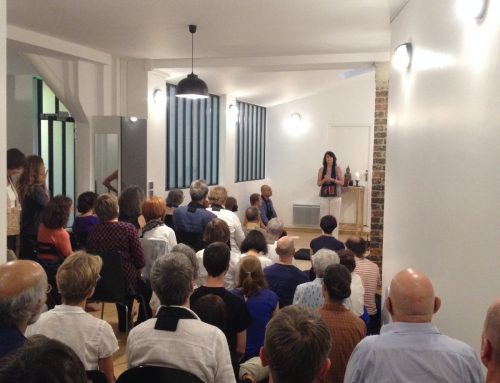I’ve been thinking about a question someone asked: Is there ever any mention of compassion in this Zen practice? Is there any emphasis on compassion? I was thinking about how best to address that question, all the while asking myself that question. I have many answers for it, and I offered some of those answers when the question was first posed. But I am rarely satisfied with the answers that I provide in response to questions that people ask; in fact, part of me is never satisfied. Everything is always open-ended…
Read more here
Enseignante Zen et poète, Sensei Amy “Tu es cela” Hollowell est née et a grandi à Minneapolis, aux Etats-Unis. Arrivée en France en 1981 pour étudier la littérature et l’histoire, elle y est restée, s’installant à Paris, où elle élève ses deux enfants et gagne sa vie en tant que journaliste.
The Zen teacher and poet Amy “Tu es cela” Hollowell Sensei was born and raised in Minneapolis, but came to France in 1981 to study literature and history and has lived in Paris ever since, raising her two children and making a living as a journalist.













Whenever we name or define, there are limitations — language is limited by nature.
However, precision is important…
When I speak of compassion, I am referring to what arises with the "insight" or "experience" — direct realization — of "seeing" and "feeling" that one IS the other. The clothes that don’t fit are my clothes.
I would say empathy, by definition, implies one AND the other, it means "I" participate in or relate to "his" or "her" suffering; there remains separation, self and other, and it is limited.
Because compassion is boundless, it implies, as Chogyam Trungpa said, "larger-scale thinking, a freer and more expansive way of relating to yourself and the world."
There is something interesting about the example with the clothes you give.
You feel they are not comfortable. Becouse you know from experience – in time.
I guess i would call this empathy. "You" are feeling that – based on some experience of the past.
This is interesting. For years I ask myself what is the relation between empathy, intuition, compassion.
But to me it feels very much there is a difference – although they also connect whithout trace.
Could we say empathy is the mechanism used in action?
Could it be like compassion is when you see the pure energy of something and you act by it?
"Seeing" instead of "knowing"?
when i compare it to the proces of drawing:
When you are in "perception" you still see "something" – there is a last rest of concept/ knowing/judgement: me and the other. Still making "something" – "solid" and yourself as a witness. I am drawing this. Even on microlevel : the hand , the nose…
One layer lower things get fluid. They "appear" to us in the light. we don’t see something – we see the nature as completely interconnected with everything. Impossible to see it as solid. No concept, no witness, no judgement, no guilt , just drawing. I am not drawing. My hand is- connected with.
As things "appear " in the light – everything is interconected. Everything comes from something. We are all in this together. This is fundament of compassion: the action based on the inner sense of everything is interconnected.
This seeing ( knowing without analytical knowing) is not in time. The action is not in time – it is astthings come to us – immediate.
So as we can not want " to see" – we cannot want " to be compasioned". We don’t loose energy in "giving" when we are compasion.
Therefor I make a difference with empathy. For empathy can be in time – using the passed by thinking about it.
Sure there is a deep connection between the two. As i said: for years i am trying to understand the relation between intuition, empathy, and compassion – and lately also "instinct" joined the club.
Maybe you can help me to clear it out?
Like and dislike = a rough sense in defence we are often in.
More subtle than like and dislike: It is not even to be able to connect with things becouse we are not able to see them. Unable to pervade nature of things becouse we even don’t get to see them…
This "beyond" (likes and dislikes) is actually "wider" …
Yes, I think I see your point.
Wishing and trying to be “beyond” one thing gets me stuck in the other.
And when I have a clear definition of freedom – and I want to have it – I will for ever be unfree because of this “freedom”.
The true meaning of being present beyond likes and dislikes; the true meaning of freedom; and maybe also the true meaning of surrender; can not be grasped in words and concepts, I suppose.
And so we keep grasping for it without ever being completely satisfied with the words and the concepts we come up with.
Keeping silent is an option.
But on the long run we will not be satisfied with that either. I wont..
Yes, i guess you could mean by "surrender" only the movement – feeling the flow.
But how i use the word: the witness does not "surrender". In witnessing there is still a frequence of doing. In "surrender" there is no doing anymore – there is just being.
What i mean by "complete surrender" is not knowing – just being .
When there is stil knowing about the flow – at that moment – it is not realy "surrender" to me. I would not even use the word flow in that case.
Becouse flow and not knowing are verry conected to me.
We only know the flow from afterwards? The minute it stops?
Would you use another word for those last cases then? and which?
The first second of "le regard" in metro – there is no witness.
how refreshing these words – thank you so much sensei;
it reminds me of living the nens: live the first nen, be it, experience it, so you get to live the second nen and be it, experience it, know it. Then you are able to pass on to the life of the third nen, because you know and live the reality of the first two nens. It is all-inclusive in its exclusiveness and the other way round as well. I sit here smiling and feel my flow: I feel very much alive now. This is it.
Thank you.
Thanks all for your comments.
This "beyond" (likes and dislikes) is actually "wider" — it includes likes and dislikes, judgement and non-judgement, awareness and unawareness, approval and disapproval. "One" does not exclude "the other," which is not actually "other."
Meanwhile, surrender just means movement, not resisting (the natural flow of "life,") moment to moment.
Thank you for this , Sensei.
I have to got to work but this is a first thing:
there is one thing in all this that is verry crucial to me :
and we never use the word???? : "surrender" –
I feel we can train a lot – we can "do" a lot of things -but there has to be a moment of "complete surrender"? –
??? compassion = the attitude, the action that emerges from the complete awareness ( = different of knowing with our mind) – that everything is interconected.???
Nothing to do with being a good girl.
5 in the morning, just peeked online to sniff some Wild Flower. What a wonderful way to start this day. Precise. Intelligent. Generous. Fragrant. Thank you.
That’s an impressive talk, Sensei.
I printed it, read it, looked in the mirror and came up with a question.
But firs of all thanks for posting this!
A returning sentence in the talk is: “being present beyond likes and dislikes.”
And yes that, I would agree, is so essential about practice.
At the same time I – for one – can be pretty judgmental.
How do these two things relate?
Could also link to:” looking outside and see that I am everything.”
Brings to mind something Thich Nhat Hanh supposedly said about boat refugees, who were assaulted by pirates. Women were raped, children murdered, possessions taken away.
He said: I am the raped woman, I am the parents watching their child getting murdered, I am the defenseless child, and also I am this pirate who rapes a woman, who kills a child …
(Can’t find the exact quote right now, so this is just how I remember it)
I can – to a certain extend – relate to, and identify with, people who do horrible things.
I know they are no monsters, but they are people just like me. That’s the frightening thing; the mass murderer is a kid like me, whose life took a corner or two that my life did not. Maybe barely so.
Still, I do not approve the actions of mass murderers. I am not beyond my dislikes about that so to speak.
Thich Nhat Hanh can “be” the pirate, but he is no pirate, precisely for this reason; that he can “be’ the pirate as much as he can “be” anyone else, notably the pirates’ victims.
If he actually would start to kill and rape innocent refugees, I would think him a lesser teacher. Call me old-fashioned.
So reality tells me I can both be judgemental and (to a certain extend) non-judgemental.
How do they relate? How can I solve this contradiction?